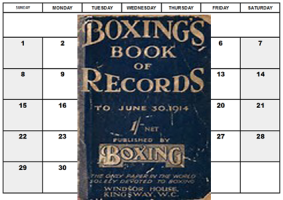
On This Day In Boxing History!
2009: Manny Pacquiao vs Ricky Hatton
May 2nd
1904: Stanley Ketchel KO1 Kid Tracy
1924: Young Stribling W10 Tommy Burns
1932: Benny Leonard TKO4 Willie Garafola
1941: Eddie Booker W10 Shorty Hogue
1946: Tony Zale KO4 Eddie Rossi
1947: Sandy Saddler KO3 Joe Brown
1954: Jimmy Carruthers W12 Chamrem Songkitrat
1955: Archie Moore W15 Nino Valdes
1958: Archie Moore WSD10 Willi Besmanoff
1965: Jeff Harding born.
1976: Éder Jofre KO3 Michel Lefevbre
Luis Estaba W15 Juan Alvarez
1986: Mike McCallum TKO6 Jimmy Shavers
1989: Muangchai Kittikasem W12 Tacy Macalos
1992: Buddy McGirt TKO7 Delfino Marin
1998: Fabrice Tiozzo KO1 Terry Ray, Paris
Hassine Cherifi W12 Keith Holmes, Paris
2009: Manny Pacquiao KO2 Ricky Hatton
Humberto Soto KO9 Benoit Gaudet
Anselmo Moreno W12 Wladimir Sidorenko
Ina Menzer W10 Franchesca Alcanter
2014: Siriporn Thaweesuk TKO6 Ellen Meijer
2015: Floyd Mayweather Jr W12 Manny Pacquiao
Vasyl Lomachenko KO9 Gamalier Rodriguez
Erica Anabella Farias W10 Klara Svensson
Christina Hammer W10 Kali Reis

